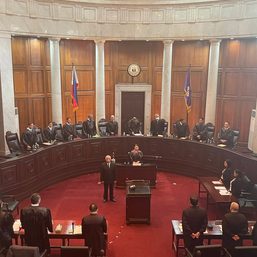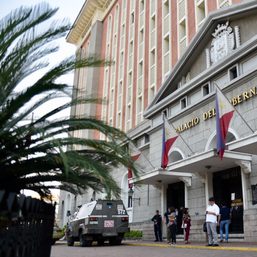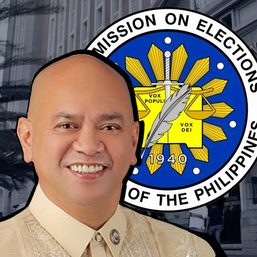SUMMARY
This is AI generated summarization, which may have errors. For context, always refer to the full article.
![[OPINION] Cha-Cha and the demolition of the party-list system](https://www.rappler.com/tachyon/2021/02/tl-chacha-demolition-of-partylist-February-12-2021.jpg)
There is now another attempt by Congress to amend the protective economic provisions of the 1987 Constitution through a simple legislation. Resolution of Both Houses No. 2 (RBH 2) passed the House Committee on constitutional amendments and would be up for plenary hearings this month.
RBH 2 was similar to its predecessor, RBH 1, introduced by former House Speaker Sonny Belmonte during the 16th Congress in 2015. Both resolutions aimed at amending the economic provisions to open more sectors of the economy to foreign ownership and control. To facilitate its passage, RBH 2 dropped the previous proposal on foreigners’ owning private lands in the Philippines.
This legislative system of amending the Constitution is a “mongrelized process,” according to Albay Representative Edcel Lagman. It is a violation of Article XVII of the Constitution which allows only 3 means of amending the charter: Constitutional Assembly (Con-Ass); Constitutional Convention (Con-Con); or People’s Initiative.
There is, however, a counterpart resolution filed in the Senate by Senators Francisco Tolentino and Ronald “Bato” dela Rosa specifically calling for the convening of Congress as a constituent assembly (Con-Ass) to introduce “limited amendments” to the 1987 Constitution. If a Con-Ass is called, these amendments to the Constitution may include not only economic matters but other provisions, such as the party-list system. Members of the ruling coalition in both chambers of Congress cannot simply ignore President Rodrigo Duterte’s explicit order to either amend the party-list provision or remove it in the Constitution.
Whither the party-list system?
The party-list system was already bastardized by the recent Supreme Court decision, and now, it is up for demolition. In the Atong Paglaum v. Comelec decision, the Supreme Court reversed its former ruling in 2001 that only those from the marginalized and underrepresented sectors, or those that did not have “well-defined constituencies,” could run in the party list. The court ruled that the party-list representatives need not represent them, and it was enough that they advocate common ideologies or principles “regardless of their economic status as citizens.”
This new interpretation, according to former Chief Justice of the Supreme Court Artemio Panganiban, elbowed out the “truly poor and powerless” and enabled the “dynasts and the moneyed” to corner the party-list representation in Congress.
It is no wonder that since the Supreme Court decision, more and more party-list representatives come from the old trapos and dynastic clans. It has become a joke, for instance, to hear of Mikey Arroyo, son of former President Gloria Arroyo, elected as the representative of a party list for security guards and tricycle drivers. Today’s Congress saw a decrease in number of party-list groups headed by representatives coming from the economically and politically marginalized sectors.
Who are the marginalized and underrepresented sectors?
Who are really “the marginalized and underrepresented sectors who lack well-defined political constituencies?” They are the vast majority of the Filipino people, the 99% of the population versus the 1% of the elite who monopolizes wealth and politics in the country.
A study presented to Congress by Representative Joey Salceda, sourced from the 2018 Family and Income Expenditure Survey, showed that the poor and the middle income groups (from lower to upper middle) represented 99% of the population (104.5 million out of 106 million population), while the upper and rich income groups represented a mere 1% of the population (1.36 million).
In the study, the poor and low income groups earn from less than P12,000 to roughly P23,000 per month, while the middle classes (from lower to upper middle class) earn between P23,000 to roughly P140,000 per month. The upper income group earns between P140,000 to roughly P234,000 a month, while the rich income group earns more than P234,000 a month! This is a very conservative estimate of the earnings of the upper and rich income groups (the 1% of the population) where almost all members of Congress, the top officials of the government, and the oligarchy belong.
The anti-dynasty provision
The issue of party-list representation for the ‘’marginalized and underrepresented sectors” is linked to the anti-dynasty provision of the Constitution. Article II, Section 26 of the Constitution explicitly states: “The State shall guarantee equal access to opportunities for public service, and prohibit political dynasties as may be defined by law.”
The dynastic clans are monopolizing Congress and it is very clear in the legislative districts (243) where the dynastic clans control almost all of the seats. The party-list system, on the other hand, has only 61 reps in the 18th Congress (20%), and because of the recent Supreme Court ruling, these seats have been opened to political clans creeping through the backdoor of the party-list system.
Up to now, no law on the implementation of the anti-dynasty provision has been passed by Congress. We now have the 18th Congress – starting from the 8th Congress convened during the ratification of the 1987 Constitution – and yet, no law has been passed to implement the anti-dynasty provision.
The latest attempt was last year when the Inter-Agency Task Force on Federalism and Constitutional Reform, composed of 11 member-agencies in the Duterte administration, proposed a definition of political dynasty where relatives within the second degree of consanguinity are banned from running in the same elections. The proposal was quickly shot down by the House Committee on constitutional amendments led by congressmen from dynastic clans.
Towards more proportional representation
The party-list law is one of the gains of the anti-dictatorship struggle. Even the 20% cap of party-list seats in the Lower House is a leap compared to the centuries-old system of elite domination of Congress with hardly any representation from the marginalized sectors.
The party-list system is based on the idea of “proportional representation” enunciated in Republic Act No. 7941, the enabling law of the party-list system. Proportional representation is founded by John Stuart Mill’s concept of a representative government where divisions in the electorate are reflected proportionately in the elected body. It has been adopted by many countries to ensure a cross-range of representation in the legislative body.
In Germany, for instance, the Bundestag has 598 members, divided equally into the state-level representatives (elected individually) and those elected through the party-list system. Ours is a very limited version of proportional representation, but even this is up for abrogation today by the Cha-Cha proponents.
While we fight for the return of the party-list representation to the marginalized sectors, we must not lose sight of the fight for genuine proportional representation based on the majority of classes and sectors that comprise our society. This can only be possible when the Congress of the elite becomes a People’s Congress, and when the dynastic clans are replaced by the representatives of 99% of the population. – Rappler.com
Sonny Melencio is a long-time activist in the Philippines and the chairperson of the Partido Lakas ng Masa (PLM). He is also the author of a semi-biographical book titled Full Quarter Storms: Memoirs and Writings on the Philippine Left.
Add a comment
How does this make you feel?


![[OPINION] Fiscal firestorm and the confident crusaders for transparency](https://www.rappler.com/tachyon/2023/10/fiscal-firestorm-confident-crusaers-transparency-october-3-2023.jpg?resize=257%2C257&crop_strategy=attention)


There are no comments yet. Add your comment to start the conversation.